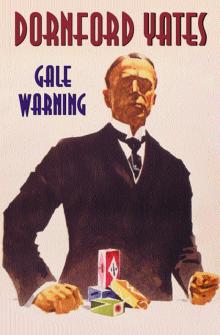- Home
- Dornford Yates
Courts of Idleness Page 3
Courts of Idleness Read online
Page 3
“Gone to find Fay. I wish they’d buck up. I want my tea awfully.”
Mr and Mrs Fairie were standing upon the promenade-deck of the good ship Castle Rising, due to sail from Southampton that same afternoon. Southwards, too, over the high seas, out of the grey March weather into the warm sunshine, and so, presently, to fair waters, where the air is dry and gentle and there is no edge to the wind’s blowing. As Fairie had predicted, the Brokes, brother and sister, were also aboard. At Rih the liner, herself bound for Cape Town, was to break her voyage. Except at this chosen island she would call nowhere.
There was only one gangway left now, and the crowd upon the quay had been roped back and to one side. Only the business of getting the mails aboard was progressing steadily. The stream of canvas bags seemed to be never-ending. On the fringe of the press of people a little photographer was exhorting those on board to avail themselves of the opportunity his camera held out to them. One or two took his advice and then bellowed addresses across the twelve feet of sea. No money passing, it seemed clear that he was a speculator. All things considered, so were his patrons. Despite a searching east wind and more than a tang of rain in the air, the crowd seemed in a good humour. One poor girl was crying a little, but by no means bitterly; now and again she smiled through her tears. There was no real distress anywhere. Odd messages and injunctions were shouted and heavy jokes cracked, but, for the most part, connected conversation being out of the question, friends and relatives upon the quay contented themselves with nods and becks and wreathed smiles without number. In the background one or two friends of first-class passengers lingered somewhat uncertainly.
It was not an exhilarating picture – very dull, really, and commonplace. Yet Bill Fairie and Betty, his wife, leaned comfortably on the broad rail, watching it all, a strange feeling of satisfaction in their hearts. The knowledge that they were for fresh fields and pleasant places, blue sky and shores dressed all with sunshine, invested the grey scene with a peculiar interest. For them even the black weather had lost its sting.
The Brokes appeared, making their way along the deck towards their cousins. As they came up:
“At last,” said Betty. “Where have you been, you two?”
“You may well ask,” said Robin aggrievedly.
Fay Broke leaned on her brother’s shoulder and laughed helplessly.
“If you could have seen him, darling,” she said.
“Oh, very comic, believe me,” said Robin coldly. “Quite side-splitting. When I say that it was in an endeavour to unlock her cabin-trunk that I lay down upon the floor—”
“But why didn’t you make Falcon—”
“I’m coming to your handmaid in a minute,” said Robin. “It was she who was responsible for that most droll of moments, when my head was jammed between the trunk and the dressing case by her sudden opening of the door.”
He stopped. Betty and Fay were shaking with shameless laughter.
“Not her new dressing case?” said Fairie anxiously.
Broke regarded him scornfully. Then:
“Lubber (nautical),” he said.
“Well, Fay and I are going down to have tea,” said Betty. “Are you coming?”
“Tea?” said her husband. “Certainly not. I’m going to wait for the grog-tub. But don’t let me keep you. If you want me, I shall probably be on the larboard tack, slightly abaft the main hatch. Of course, that’s assuming the mizzen-shrouds aren’t – er – shrouded. In that case—”
“I don’t expect they will be,” said Betty. “But I think you’d both better come. Even if you don’t want tea, you can see the steward about where we’re going to sit.”
The idea seemed a good one, and the four descended to the saloon.
The straight charge which Fairie laid upon the chief steward, that he should place them all four together and with nice neighbours, was not forgotten. When, one by one, they strolled – rather late and a little unsteadily – into the saloon for dinner, it was to find that they had been allotted seats at one of the side-tables, and that their companions consisted of a good-looking girl with drop-earrings, and an eminent King’s Counsel.
“I’m not at all sure I like this motion,” said Betty, settling herself in her revolving chair.
“It won’t last long,” said her husband briskly. “The breeze is freshening.”
“Yes,” said Broke. “I expect the waves in the Bay’ll be wonderful. By the way, Bill, I don’t think those could have been rats you saw leaving the ship at Southampton.”
“Will you be quiet?” said Betty. “The Bay’ll probably be like a mill-pond.”
“You mustn’t expect too startling a resemblance,” said Fairie. “I mean, those of the passengers who are not unconscious can usually tell the difference.”
“I wonder,” said Fay suddenly, “I wonder if Lester remembered to pack my–” Here the liner lurched somewhat heavily to port. “O-oh! That was a big one, wasn’t it?”
“Only dropping the pilot,” said her brother. “What you felt was the recoil.”
“Rubbish,” said Betty. “It’s getting rough.”
“Rough,” said Fairie. “You rave, woman; this is nothing. Old salts would tell you we were becalmed. Isn’t that so?” he added pleasantly, appealing to the girl with the earrings.
“I think you’re putting it rather high,” she said, with a smile. “All the same – well, we haven’t got the fiddles on, have we?”
“I can see that you are a traveller,” said Fairie. “My women kind, poor fools, have lived such sheltered lives—”
“Do you mind kicking him for that?” said Betty. “He’s got a bruise just above the right ankle.”
The girl laughed merrily, while the ship heaved slowly upwards and then rolled slowly to port and starboard in turn.
The man of law leaned forward.
“I trust,” he said, addressing himself to Fairie, “that the statement which you made a few moments ago as to the breeze – er – freshening was without foundation.”
“Wholly,” said Fairie.
“That, of course,” said the other, “is incredibly comforting. At the same time, assuming your friend’s theory to be the correct one, I cannot forget that we have now discharged some four pilots, each apparently of a rather more ample habit of body than the one before.”
“Unlike my wine,” said Fairie, wiping his dinner jacket with a napkin, “that circumstance had not escaped me. The burning question, therefore, would seem to be, how many pilots have we on board?”
The lawyer nodded.
“And of what proportions,” he said. “Are you going to Rih?”
“I am,” said Fairie, “and the others in my train.” The great man adjusted his eye-glass and looked round, beaming.
“Then perhaps I may take it that we are all proposing to illuminate the—”
The girl by his side shook her head.
“No,” she said; “I’m going on to Cape Town.”
“Must you?” said Broke. “I mean…”
The girl smiled.
“Afraid so,” she said; “thanks all the same. Besides, South Africa’s a great place.”
“I know,” said Broke. “But is it anything else?”
“Of course it is. Why, if you…” She plunged into a recital of some of the qualities of her Canaan. Born and bred there, she was returning after an absence of five years – long ones, it seemed. Broke listened amusedly, protesting now and again. So the two slipped into a conversation of their own.
“This is our first visit to Rih,” said Betty, addressing the King’s Counsel.
“Indeed,” said the latter. “With me Rih has become a habit, almost a matter of course – the Sunday morning sausage of my solar year.”
“You like it so much?” – with a smile.
“It suits me.”
“And it’ll suit me,” said Fairie. “I can see that. A man of simple tastes, give me a long day, a long chair, and a long drink, and I—”
“And a
long wind,” said Fay. “Oh, no. You’ve got that.”
“It is an age of rudeness, is it not?” said Fairie, turning to the lawyer. “Now, when I was a child—”
“You needn’t think you’re going to lie in a chair all day,” said Betty. “What are the tennis-balls for?”
“Sale, as far as I’m concerned,” replied her husband. “What about my wasted tissues? Shall I not build them up?”
“Are you also a labourer?” said the man of law.
“You see in me,” said Fairie, “a careworn drudge.”
This was too much. With one accord Betty and Fay turned upon the miscreant and rent him. At length:
“I must apologize,” said the former, turning to the King’s Counsel, who was listening amusedly, “but there is a limit, isn’t there? And when my husband starts—”
“On the contrary, my dear lady, your exposure of him is most opportune. The combination of hypocrisy and sloth is almost Cretian.”
“Talking of activity,” said the unabashed Fairie, “the cheese I had at lunch—”
“Do you want to make me ill?” said his wife darkly.
“I agree,” said the lawyer, waving away the horseradish sauce. “The reference was ill-timed. One must eat, of course. At least, they say you should. But there are occasions upon which the thoughts should dwell upon food lightly, turning rather to loftier things…”
“The high seas, for instance,” said Fairie, as the saloon soared sideways into the air after the manner of a gigantic lift. “Is there a casino at Rih?”
“There is – euphemistically known as The Strangers’ Club. In a sense it more resembles a hospital.”
“A hospital?”
“I mean that it is supported entirely by voluntary contributions.”
“I see,” said Fairie. “Put a dollar on zero and keep The Strangers’ Club for ’alf a mo.”
The KC nodded.
“That’s the idea,” he said. “Are you charitably inclined?”
“My beneficence,” said Fairie, “is my undoing. More than one such institution owes its open doors to my generosity. The Monte Carlo Institute for the Mentally Deficient has a ward called after me.”
“A whole ward?” said the man of law. “Now, if you had said an operating table…” He paused for a moment to join delightedly in the merriment. “It is, indeed, a poor heart,” he added, “that never rejoices. And now” – he glanced at the menu – “I wonder whether it would be madness to essay some grouse.”
By half-past eleven o’clock it was really rough. They had run into the tail-end of a whole gale, and, seaworthy as she was, the liner pitched and rolled desperately.
The last of his party to turn in, Robin Broke – himself an excellent sailor – staggered along the deck, slithered down the companion, and ricocheted along the passage volubly. A dim light showed him his cabin’s number. As be opened the door, a roll of the ship assisted him into the apartment anyhow. The washstand, however, brought him up sharp, and the next moment the vessel righted herself, and the door slammed to.
“Thanks very much,” said Robin. “And now where the deuce do they keep the electric light?”
The operation of groping effectively about the cabin’s sides was rendered difficult by the motion of the ship, but, after a little delay, his fingers closed about the porcelain switch, which was lurking beneath a pendent overcoat. With a sigh of triumph be turned the button… He twisted it four times each way before giving up hope. Drowning men catch at straws. But there was nothing doing. The switch was out of order. Robin groaned.
“Of all the—”
“I say,” said a voice, “are you sure this is your cabin?”
Robin stared into the darkness.
“Well, it was,” he said; “when I was dressing for dinner, I mean.”
“There now,” said the voice. “I was half afraid, too. I’m most awfully sorry.”
“That’s – er – all right,” said Robin uneasily. “I mean—”
“You see,” said the voice, “I couldn’t stand the motion after a bit, and came to lie down. I wasn’t sure of the number, and, when the light wouldn’t turn I couldn’t see if there were my things here or somebody else’s. I tried to feel about, and there was a sponge just where—”
“Have you got a sponge, too?” said Robin.
“Idiot. And then the ship gave an awful roll, and I felt so terribly ill, I just risked it and lay down. I’m all right if I lie down, you know. Quite all right.”
“I’m glad of that,” said Robin heartily. “Very glad.”
“Yes, but – I mean, I’m awfully sorry. If you’ll give me a minute or two, I’ll get up and make a dash for it, somehow. I do hope you understand. You see,” the voice continued, “you’re one of these good-sailor people. You don’t know what it is all of a sudden not to care what happens or where you are, so long as you can lie down. You don’t know that feeling.”
“Forgive me,” said Robin, “but it’s – er – it’s just as well I don’t, isn’t it?”
“Oh” – the voice trembled with laughter – “I’m so awfully sorry.”
It was a nice voice. Clear-toned and merry – very eloquent.
“I wish I could see you,” said Robin suddenly. “If only I’d got a match…”
He began to feel his pockets.
“I’m glad you can’t,” said the girl. “It makes it a little better. I saw your face as you came in,” she added.
“That ought to have restored you.”
“It made me feel more easy. I was so frightened when I heard you opening the door. Then I saw you, and I thought you looked as if you’d understand.”
“My dear,” said Robin, “you were right. I do. Every time. So she mustn’t worry. Besides, mal de mer covers a multitude of sins. All the same, this isn’t a sin at all. It’s a pleasure. Which reminds me, I’m not looking after you very well, am I?”
“I think you’re wonderful,” said the girl.
“And I’m sure you’re cold,” said Robin, taking a light overcoat from one of the hooks. “Where are your small bare feet?”
“Bare?” cried the girl. “I’m fully dressed, just as I was for dinner. I told you I—”
“My mistake. Still, we’ll cover them up. It isn’t as if the light was on.”
“For all you know they may be hideous. Darkness covers a multitude of—”
“Pleasures. I’m sure of it. That’s what’s so tantalizing. Besides,” added Broke, spreading the coat carefully over my lady’s limbs, “big feet and big eyes never go together.”
“Another bow at a venture?”
“Not at all, my dear. You see, you’re only a dark horse. And I always put my shirt on a dark horse.”
“You’ve put your coat on this one.”
“And my shirt. Listen.” He flicked a startling example of the shirt-maker’s skill from another hook and laid it across her feet. “Now I’ve backed you both ways – a coat to win and a shirt for a place in your heart. Selah.”
The girl broke into long laughter. At length:
“You are mad,” she said. “But you’re very kind; and I’m going to make my dash in a minute. I think I’ve done enough trespassing.”
“I never prosecute,” said Robin.
“No? Still…”
She hesitated.
“Go on,” said Robin.
“Ships that pass in the night,” she murmured dreamily. “That’s what we are.”
“Are we?”
“Yes. Ships that pass. And that’s why I must go.”
“Aren’t they ever becalmed?”
“Never for long. When day comes, they’re always out of sight.”
“Not always.”
“Invariably.”
“I see,” said Robin meditatively. “The difficulty here is that I am disabled. Lost my figure-head somewhere in the Channel. Won’t you take me in tow as far as the Lost Property Office?”
“No.”
Robin sighed. Then:
/>
“I shall know you again, anyway,” he said. “Instinctively. Besides, the moment you open your mouth – oh, I’d love just one look at you. Mayn’t I?”
He could hear the girl shake her head. Then:
“No,” she said gently. “I hate to say it, when you’ve been so awfully good. But you see – besides, you’re going to know me again anyway, aren’t you? Instinctively, too.” This in a grave tone, the faintest suggestion of mockery lurking behind it.
“You witch,” said Robin. “You maddening, unprincipled witch.”
A low ripple of merriment answered him. He set his teeth.
“That’s right,” he said bitterly. “Deride the helpless male. And now you’ve roused me. I will find you, if I have to scour the ship.”
My lady stretched out what was a shapely arm, the hand groping its way towards her companion.
“Where is he?” she said, her voice all uncertain with laughter. “Oh, there you are.” The fingers closed about his sleeve. “No. Don’t move. Perhaps you will find me. But that’s for tomorrow. At the present moment you shall look for somebody else. There’s a stewardesses’ room place just across this floor or deck – whichever you call it – a little way down the other passage. Will you go and see if there’s one there? She’ll know where my cabin is, and help me to get to it.”
“But why can’t I—”
The grip on his sleeve tightened.
“Please.”
“Oh, all right,” said Robin. “Are you sure one’s enough?”
“I think so. And thank you once again for being so good to another ship in distress.”
As the fingers slipped away, Robin caught them. Smooth, cool, pointed they were – he could feel that. Ringless, too – it was her left hand – and their nails polished. For a moment he held them.
“Wireless communication with the mainland has its points,” he said slowly. “Personally, I’d always sooner be in touch with a sister ship.”
“Even if she only passed in the night?”
Robin lifted the fingers to his lips.
“Till tomorrow,” he said.
The next moment he was in the passage. With some difficulty he found the stewardesses’ room, but there was no one there. He went the length of both passages, but apparently not a soul was abroad. So he came again to his cabin, unevenly, for the liner was still all over the place. They were getting a dusting, certainly.

 Berry and Co.
Berry and Co. Jonah and Co.
Jonah and Co. The Funny Bone: Short Stories and Amusing Anecdotes for a Dull Hour
The Funny Bone: Short Stories and Amusing Anecdotes for a Dull Hour The Brother of Daphne
The Brother of Daphne Courts of Idleness
Courts of Idleness Ne'er Do Well
Ne'er Do Well She Painted Her Face
She Painted Her Face Safe Custody and Laughing Bacchante
Safe Custody and Laughing Bacchante As Berry and I Were Saying
As Berry and I Were Saying And Berry Came Too
And Berry Came Too Valerie French (1923)
Valerie French (1923) Brother of Daphne
Brother of Daphne Berry Scene
Berry Scene Gale Warning
Gale Warning B-Berry and I Look Back
B-Berry and I Look Back Storm Music (1934)
Storm Music (1934) House That Berry Built
House That Berry Built